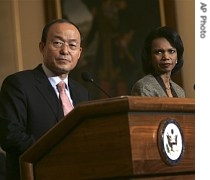2007年VOA标准英语-Rice Warns Against New North Korean Nuclear Tes(在线收听)
By David Gollust
State Department
05 January 2007
U.S. Secretary of State Condoleezza Rice said Friday a new North Korean nuclear test would only deepen that country's isolation. Rice, who met with her South Korean counterpart in Washington, said the six-party talks on North Korea's nuclear program could resume in short order if Pyongyang is prepared to be forthcoming. VOA's David Gollust reports from the State Department.
 |
| Condoleezza Rice, right, and S. Korean Minister of Foreign Affairs and Trade Song Min-Soon take part in joint news conference at State Department in Washington |
Rice and other officials here refused to discuss whether the United States had intelligence information to support such accounts.
But at a press appearance with her South Korean counterpart, Rice said another test would not make political sense for Pyongyang and would only compound the isolation it found itself in after its first test in October which drew sanctions from the U.N. Security Council:
"The North Koreans would have to know that any such test would obviously further deepen their isolation," she said. "The last test, of course, got them a Chapter Seven resolution which was a 15-to-zero vote and fairly extensive sanctions. So I don't think that from the North Korean point of view it would be a reasonable course and obviously the reasonable course is return to the six-party talks."
For his part, Foreign Minister Song said the Seoul government had no information that a North Korean nuclear test is imminent.
On his first Washington visit since becoming Foreign Minister in December, Song joined Rice in urging a quick resumption of the six-party talks, which had been idle for more than a year before the week-long round in Beijing last month.
He said it is Pyongyang's turn to come back with a realistic response to proposals made in December, and that continuing its nuclear program will bring that country no benefit:
"North Korea has to know that a nuclear weapon does not guarantee its security nor help in resolving its economic problems," he said. "They have to come back to the talks and de-nuclearize the [Korean] peninsula, and get a wider opening for the country in the future."
Last month, the United States is understood to have presented specifics on what North Korea stood to gain if it scrapped its nuclear program under terms of the agreement in principle reached by the parties in September of 2005.
Under that accord, North Korean steps toward disarmament are to trigger aid and security guarantees from the other participants, who include South Korea, Japan and Russia as well as North Korea, the United States and host China.
Rice said the talks could resume fairly soon if Pyongyang signaled it was ready to be constructive, but she did not repeat an assertion by a spokesman earlier that the Chinese-mediated discussions could resume this month.
North Korea was said to have refused to discuss disarmament at the last round, instead demanding that Washington lift penalties it imposed on a Chinese bank - the Macao-based Banco Delta Asia - that U.S. officials said was a hub for illicit North Korean financial activity, including passing counterfeit U.S. money.
Rice, however, said there were some productive discussions last month and didn't think the Banco Delta Asia issue was really a major stumbling block.
She noted that North Korea had agreed to discuss the matter separately with U.S. Treasury Department officials in New York, and that this is the proper channel to discuss a legal issue.
Foreign Minister Song said he agreed the matter should be addressed in parallel with the six-party talks, and not mixed with the nuclear issue.